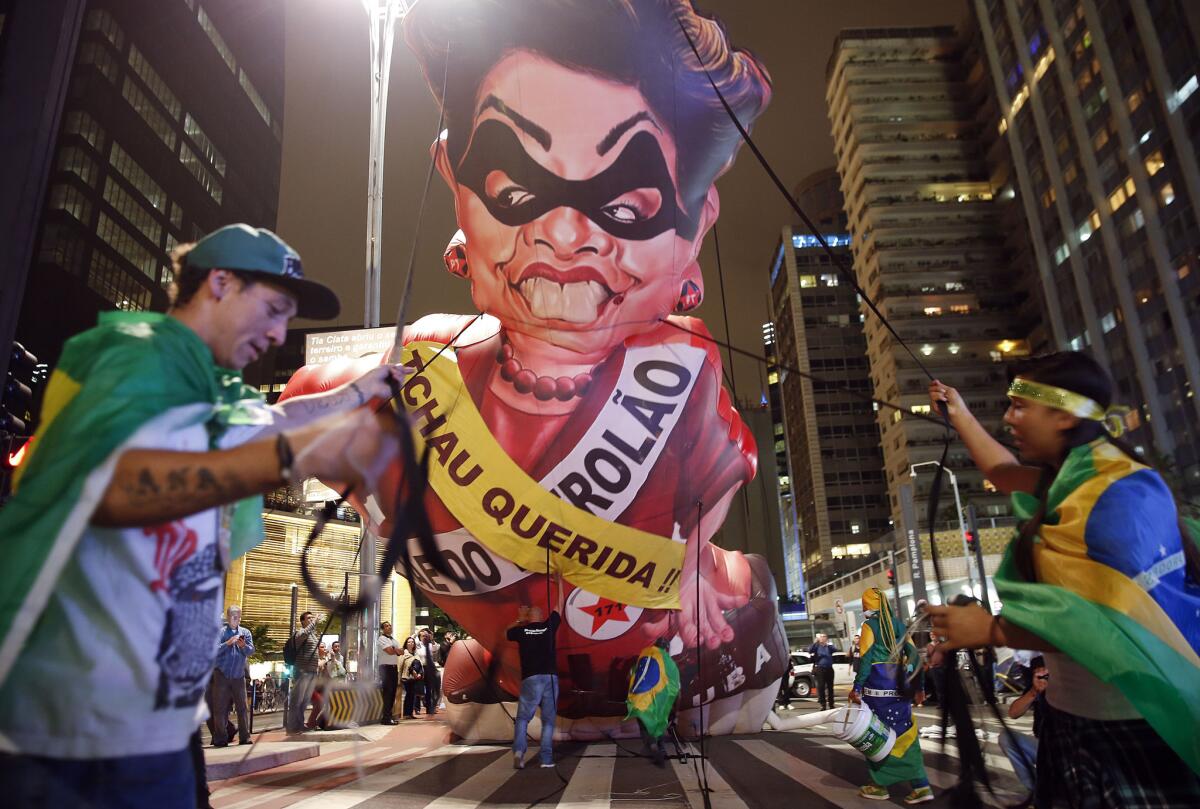After efforts to block impeachment fail, Brazil is poised to remove president

- Share via
Reporting from Sao Paulo — Though the conclusion seemed inevitable, the debate that will help decide the future of Brazilian President Dilma Rousseff dragged into its second day Thursday as senators continued to argue over whether to impeach the elected leader of Latin America’s largest country.
Surveys of lawmakers before the marathon session—and comments from many on the Senate floor—indicated there will be enough votes to remove Rousseff from office and subject her to an impeachment trial. The marathon session began at 9 a.m. Wednesday and had entered the early morning hours of Thursday.
The deeply unpopular Rousseff already had lost a round weeks ago in the lower house of Congress, where a two-thirds vote was required to advance the impeachment process. In the Senate only a simple majority of 41 votes is needed, and Rousseff would be relieved of duties as soon as she is informed of the decision.
Rousseff, who may be tried on charges of misleading fiscal accounting, technically would be removed only for 180 days as the Senate decides on permanent removal, but former ally Vice President Michel Temer has treated his ascendance as fait accompli, publicly assembling a new cabinet and planning to move the world’s fifth most populous country in a more market-friendly direction.
Opening the session Wednesday in the capital of Brasilia, Senate President Renan Calheiros, of Michel Temer’s center-right PMDB party, pleaded for civility as his house of Congress hears arguments and makes a decision.
“We are going to vote to remove a president who has been elected directly by the people. We are about to make a decision which is very serious,” Calheiros said. “So I’m going to ask all the senators to make use of the serenity and public spirit that they have prepared.”
Calheiros is likely acknowledging that the bitterly contested process to remove the former left-wing guerrilla has taken a staggering number of strange turns over the last six months, leaving the population confused and exasperated as the impeachment question often devolves into political shouting matches.
NEWSLETTER: Get the day’s top headlines from Times Editor Davan Maharaj >>
“This case has been the real-life version of a Kafka novel. It’s like ‘The Trial,’ ” said Francisco Fonseca, a political scientist at the Fundacao Getulio Vargas business school in Sao Paulo. “They have attempted to remove Rousseff and her party with whatever mechanism or argument they can muster.”
On Monday, the speaker of the lower house, the Chamber of Deputies, attempted to annul the house’s previous impeachment vote, then chose to annul his annulment less than 24 hours later. He had only recently taken over as speaker of the chamber because the previous speaker, also from the PMDB party, was removed from office last week for 11 separate abuses of power, shortly after he oversaw impeachment proceedings there.
Latin America’s largest country is facing its worst recession in decades, a multibillion-dollar corruption scandal, a health crisis triggered by the Zika virus, and the prospect of hosting the Rio Olympics in August under a government whose legitimacy is contested.
Rousseff’s popularity took a hit due to revelations of a massive bribery scheme at Petrobras, the state-run oil company. But analysts say the true causes of the fate she may face are the dire economic situation and her failure to maintain political support in the legislature.
Congress members, most of whom face criminal investigations themselves, set aside questions of corruption for the impeachment process, focusing instead on relatively minor accounting maneuvers, which Temer himself also approved.
ALSO
Impeachment or coup? As vote on president’s future nears, Brazilians take to streets in protest
On the frontline of Brazil’s war with Zika, a mother’s first question: ‘How big is the head?’
Mexico judge says ‘El Chapo’ extradition may proceed
Bevins is a special correspondent.
UPDATES:
11:27 p.m.: This article was updated with details from early Thursday.
1:41 p.m.: This article was updated to report the Brazilian Supreme Court rejected a request to halt the impeachment proceedings.
This article was originally published at 10:15 a.m.
More to Read
Sign up for Essential California
The most important California stories and recommendations in your inbox every morning.
You may occasionally receive promotional content from the Los Angeles Times.










